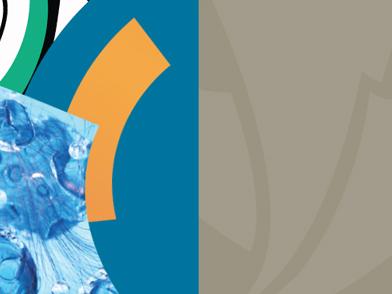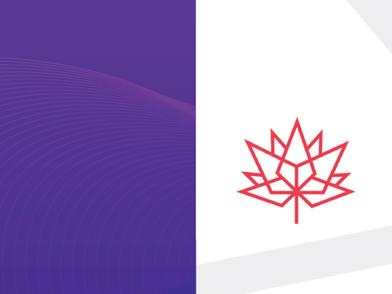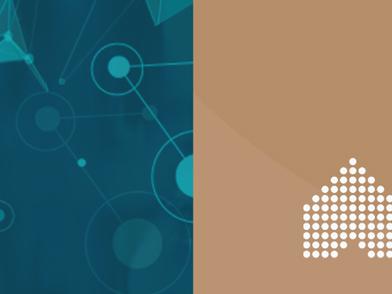
Research Support Fund
The Research Support Fund assists Canadian postsecondary institutions with the costs associated with managing their research enterprise, helping them to maintain a world-class research environment.
Grants are intended to make Canada a world leader in research and development:
- maintain modern labs and equipment;
- provide access to up-to-date knowledge resources;
- provide research management and administrative support;
- meet regulatory and ethical standards; or
- transfer knowledge from academia to the private, public, and not-for-profit sectors.
Definition of Indirect Costs
There are a number of centralized institutional activities and services that support the research mandate of the University. These vary in scope and size but are critical to our success.
Institutional activities and support services include the following areas:
- Library: operations and information acquisitions and resources
- Computing and Communications: computing infrastructure including central services, telecommunications, and data services
- Physical Plant: utilities, housekeeping, maintenance, grounds, and planning services (excluding ancillary operations)
- Research Administration: Research Services Office including central animal services, grants and contracts administration and legislated requirements for reporting on grants and activities, communications, and business development
- Central Support Services: a wide range of services ranging from payroll, accounting including research accounting, audit, environmental and occupational health, security services and purchasing to institutional costs such as legal and insurance costs
Each of these activities is vital to the overall effectiveness of the institution. Coordinating and delivering these services is a complex task and there are significant efficiencies to be obtained by managing them centrally.
Overview of how the University of Guelph Allocates the Research Support Funds grant
In general, the allocation of the RSF grant to specific units that support research activity at the University is calculated as:
RSF Allocation = (Total Unit Costs * Percentage of Research * Percentage of Federal * RSF Grant) / RSF Eligible Costs
Units incurring indirect costs of research are identified within the broad categories outlined as eligible by the RSF program. The specific units, by category, are as follows:
- Research Facilities (Utilities, Physical Resources, Waste and Chemical Resources, Advanced Analysis Centre)
- Research Resources (Library Operations, Library Information Resources, Central Computing Systems)
- Management and Administration of the Institution’s Research Enterprise (Office of Research, Research Financial Services, Administrative Offices, Insurance, Research Administration Information Management System)
- Regulatory Requirements and Accreditation (VP Research-General Risk, Animal Care Services, Environmental Health & Safety)
- Intellectual Property and Knowledge Mobilization (Research Innovation Office)
It is then determined what portion of the unit costs are used to support research activities, using various assumptions depending on the specific unit.
The total research costs determined above are prorated to reflect the portion of research that is federally funded using a three-year average of total funding received from NSERC, SSHRC, CIHR and Networks of Centres of Excellences, as reported to the University in the RSF credit data, divided over total received from external sponsors (excluding RSF & CFI). This represents total costs eligible for RSF funding.
The actual amount of the RSF grant that the University receives does not cover the total amount of eligible costs, so the grant is attributed on a pro rata basis to the eligible costs of each of the units.
Use of Funds
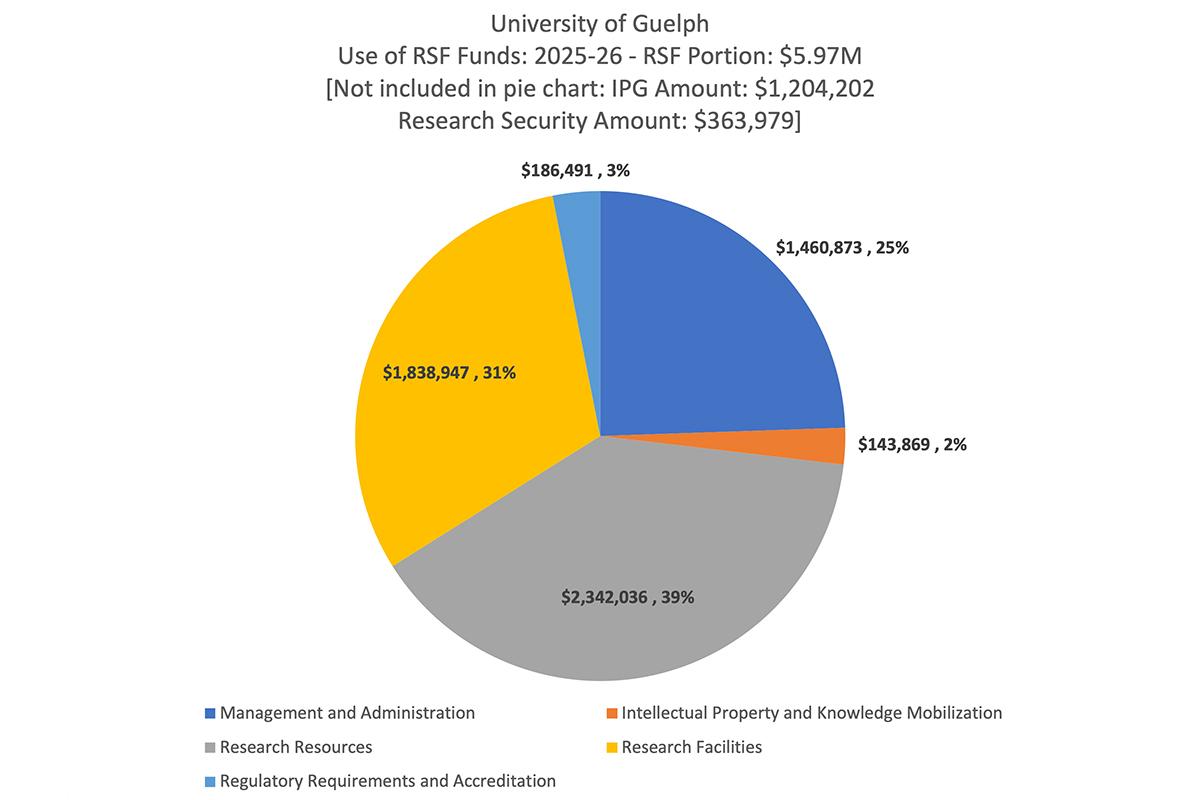
RSF Expenditure 2025-26
University of Guelph Use of Funds: 2025-26 - RSF Portion $5.97M
Not included in pie chart:
- IPG Amount: $1,204,202
- Research Security Amount: $363,979
Included in pie chart:
- Management and Administration: $1,460,873 – 25%
- Research Resources: $2,343,036 – 39%
- Regulatory Requirements and Accreditation: – $186,491- 3%
- Intellectual Property and Knowledge Mobilization: $143,869 – 2%
- Research Facilities: $1,838,947 – 31%
Previous Use of Funds
RSF Institutional Performance Objectives and Indicators
The performance objectives and indicators outlined below are consistently applied and measured each fiscal year, with progress reported annually in the corresponding sections that follow.
RSF Progress Report 2024-25
Institutional Project Grant (IPG)
Stream 1: Advanced Analysis Centre
The Advanced Analysis Centre (AAC) at the University of Guelph is a premier research facility located in the Summerlee Science Complex. It houses over $37 million in research equipment and offers state-of-the-art facilities such as Nuclear Magnetic Resonance (NMR), Mass Spectrometry (MS), Electron Microscopy (EM), Advanced Light Microscopy (ALM), Genomics, and a plant growth facility (Phytotron). The AAC's mission is to provide researchers with access to modern research services, analyses, instruments, technology, technical expertise, and training that are typically too expensive or specialized for individual researchers.
The AAC fosters scientific collaborations and advances research capabilities by offering cost-effective and efficient testing and experimental support services. It supports the education and training of highly qualified personnel (HQPs) through workshops, webinars, and hands-on training sessions. The AAC generates data for approximately 150 primary publications annually, illustrating its significant impact on research. Recent acquisitions, such as a helium recovery unit and a Biomek liquid handling robot, have enhanced resource efficiency and operational capabilities.
The IPG supports the AAC in the following priority area: Facilities renewal, including deferred maintenance.
Stream 2: EthOS Human Ethics System
The Ethics Online System (EthOS) at the University of Guelph streamlines the submission, review, and approval of human participant research protocols. EthOS enhances the efficiency and compliance of research operations, providing a seamless platform for managing research ethics applications. It supports the university's research community by offering extensive training and support for researchers through workshops, webinars, and hands-on training sessions.
EthOS continues to deliver many benefits across the research enterprise, including improved user experience, reduced administrative burden, and enhanced compliance with regulatory and funding organizations. The system's functionality includes automated workflows, real-time status information, and an integrated administration platform, replacing outdated forms and email submission processes.
Continued IPG funding is essential for sustaining licensing and human resource costs, which are critical for optimizing the system's efficiency and effectiveness. EthOS aims to increase the number of processed applications and enhance outreach and promotional activities to further increase awareness and usage of the system.
The IPG supports EthOS in the following priority area: Information resources, including digital resources, open access, and databases.
IPG Performance Objectives and Indicators
The performance objectives and indicators outlined below are consistently applied and measured each fiscal year, with progress reported annually in the corresponding sections that follow.
IPG Progress Report 2024-25
Research Security Stream: University of Guelph’s Research Security Program
The University of Guelph (U of G) is committed to safeguarding research while maintaining the integrity of scientific collaborations. U of G continues to develop a research security program that advances security matters in research, internationalization, and commercialization, while safeguarding against theft of research data, loss of intellectual property (IP), unwanted access and potential interference, and transfer of knowledge in ways that researchers do not intend while upholding the core value of inclusive research excellence.
U of G’s program embraces Canada’s guiding principles for research security, including the principle on equity, diversity and inclusion that promotes “diversity of identity and thought, with room for a variety of ideas, cultures, and views while ensuring that everyone, regardless of background or identity, is able to freely participate in the research ecosystem to help build an innovative, prosperous, and inclusive world.” This aligns with the University’s commitment to indigenization, equity, diversity and inclusion.
U of G will further develop its policies, practices and resources to enhance research security practices that are adaptive to evolving threats, raise awareness, and equip researchers to protect their data, results, and IP.
U of G’s program is built on strong relationships with government, funding agencies and colleagues to ensure alignment with government mandates, agency policy requirements and best practices.
Research Security Performance Objectives and Indicators
Research Security Progress Report 2024-25
Previous Research Security Progress Reports
Communication Strategy: Stories Demonstrating Impact of Research Support Funds at the University of Guelph

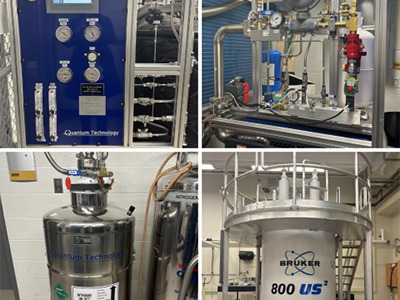


- 2022-23 - U of G’s Mass Spectrometry Facility Offers Unique Learning Experiences
- 2022-23 - New apple variety at U of G may juice up cider industry
- 2021-22 - No Waffling Around for Student Start-up Business
- 2021-22 - New Renovation to Improve Performance-Based Research at U of G
- 2020-21 - Two University of Guelph technologies receive Innovation of the Year Award 2020
- 2020-21 - Federal fund supports U of G research activities affected by COVID-19 pandemic
- 2019-20 - Enhancing research ethics at U of G
- 2019-20 - Turning research knowledge into action
Contact for Further Information
General Inquiries: research.services@uoguelph.ca
